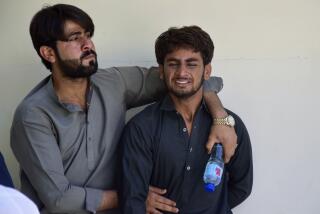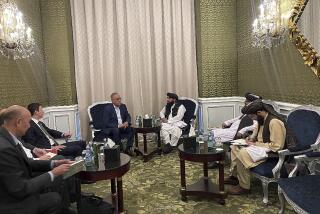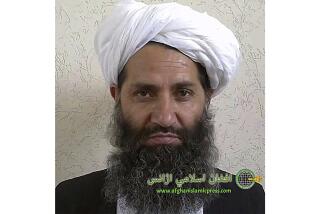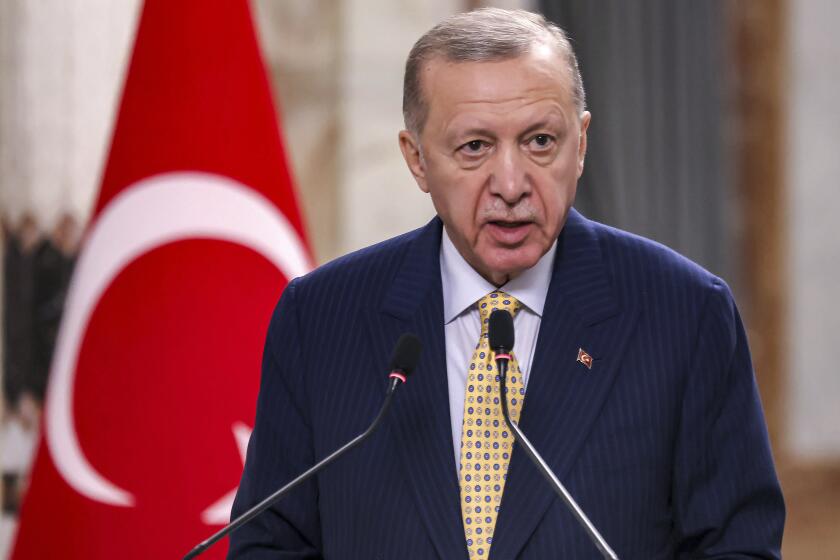Hillary Clinton warns of ‘existential threat’ in Pakistan
Secretary of State Hillary Rodham Clinton warned in unusually bleak terms Wednesday that Pakistan’s fragile government is facing an “existential threat” from Islamic militants who are now operating within a few hours of the capital.
Clinton told a House committee that the government in Islamabad is ceding territory and “basically abdicating to the Taliban and the extremists” in signing a deal that limits the government’s involvement in the war-torn Swat Valley.
“I think we cannot underscore [enough] the seriousness of the existential threat posed to the state of Pakistan by the continuing advances,” said Clinton, adding that the nuclear-armed nation could also pose a “mortal threat” to the United States and other countries.
Clinton spoke as militants expanded into new territory adjacent to the Swat Valley and 60 miles from Islamabad, and top U.S. officials continue to make regular visits to Pakistan. Adm. Michael G. Mullen, chairman of the Joint Chiefs of Staff, is visiting now. A special U.S. envoy, Richard C. Holbrooke, was there this month.
Clinton’s comments to the House Foreign Affairs Committee underscored increasing U.S. alarm at how the militants’ strength has grown even as the Obama administration has begun trying to implement a new strategy for stabilizing the country. U.S. officials are worried not only about the stability of Pakistan, but also about neighboring Afghanistan, where they are committing an extra 21,000 troops this year to try to stanch the advances of the Taliban and allied insurgents.
U.S. officials have grown increasingly critical about the deal giving control in Swat to militants, who intend to impose Sharia, or Islamic law, and the prospect that the militants will use the Swat Valley to press closer to the capital.
Before Clinton made her remarks, Maulana Fazlur Rehman, chief of Jamiat Ulema-e-Islam-Fazl, a religious party within the ruling coalition, told parliament on Wednesday that the Taliban was heading toward Islamabad.
“You talk about Swat and Buner, but according to my information they have reached much closer,” he said. “And if they continue advancing, there will soon be only Margalla Hills between them [the Taliban] and Islamabad,” he said. Margalla Hills is the dividing line between Islamabad and the North-West Frontier Province.
Also on Wednesday, the main opposition party, which had initially supported the Swat deal, openly criticized the agreement.
“The last few days show that gun-carrying Taliban are spreading to more areas and eventually want to capture the whole of Pakistan,” said Khawaja Asif, a leader of the Pakistan Muslim League-N.
U.S. officials are concerned as well about other developments, including a recent decision by the Pakistani Supreme Court to release Maulana Abdul Aziz, an anti-American cleric who is accused of ties to terrorists and has sought to impose Islamic law in the Islamabad region.
The country also has been shaken by a series of urban shootouts between authorities and militants. In March, militants attacked the Sri Lankan cricket team, and an assault on a police academy near Lahore left 20 people dead.
On the ground, analysts said, many Pakistanis in the lower and even middle classes have a romantic view of Sharia because they are increasingly worried about their personal security and have been badly served by government courts and police. These Pakistanis also don’t tend to view the nation as out of control, said Fasi Zaka, an academic, journalist and critic living in Islamabad, because most still have enough to eat and don’t have the luxury of worrying about conceptual threats.
The elite sector of society tends to be more pessimistic. But they also have the ability to move their families and savings overseas.
“And I think that’s part of the problem,” Zaka said. “Their ability to migrate capital without suffering helps explain why the elite, businessmen, civil servants are letting go and not doing their jobs, not making tough decisions, which would entail sacrifice.”
Pakistan’s ambassador to the United States, Husain Haqqani, said Clinton’s assessment was incorrect.
He said in a CNN interview that the Swat Valley is ringed by mountains and isolated. He said the government was trying to bring peace by reaching accommodations with tribal groups, just as the U.S. forces did in Iraq.
“To think that that strategy somehow represents an abdication of our responsibility towards our people and towards the security of our country and the region is incorrect,” Haqqani said.
But Clinton’s concern was echoed by Rep. Howard L. Berman (D-Valley Village), the committee chairman, who said he was alarmed by predictions “that Pakistan could collapse in as little as six months.”
Clinton called on Pakistanis, Pakistani Americans and others in the diaspora to “speak out forcefully” in an effort to change the attitudes of the Pakistani government.
“I don’t hear that kind of outrage or concern coming from enough people that would reverberate back within the highest echelons of the civilian and military leadership,” she said, in her first appearance before the committee since her confirmation hearing this year.
U.S. officials have been trying to strengthen their ties with Pakistani officials. Last week, they presided at a donor conference in Tokyo that raised as much as $5 billion in aid for Pakistan. Next month, Pakistani President Asif Ali Zardari will travel to Washington to meet with President Obama.
The Obama administration’s strategy for Pakistan and Afghanistan includes tripling the amount of economic aid for Pakistan in the hopes of strengthening its economy and civil society.
Yet the relationships with both the civilian and military officials have been complex.
Clinton said that some Pakistanis are open to the return of Sharia law in the tribal regions because their national judicial system is “corrupt” and does not function in the countryside.
“If you talk to the people in Pakistan, they don’t believe the state has a judiciary system that works,” she said.
She said that if the government doesn’t set up a functioning system, it will lose out to militants who “claim they can solve people’s problems and then they will impose this harsh form of oppression on women and others, which we find unacceptable.”
Testifying on another subject, Clinton signaled that the administration was in no hurry to further ease relations with Cuba, despite the flurry of seemingly positive signs between the two countries.
“We’re going to proceed very carefully in this process,” she said, recalling that the Cuban government had abruptly ended a thaw during the Clinton administration by shooting down two unarmed private American planes that were distributing anti-Castro leaflets.
She said the administration wanted a “change in attitude” from the Cubans, and “so far we don’t really see any movement.”
--
Zaidi is a special correspondent. Staff writer Mark Magnier in New Delhi contributed to this report.
More to Read
Sign up for Essential California
The most important California stories and recommendations in your inbox every morning.
You may occasionally receive promotional content from the Los Angeles Times.










